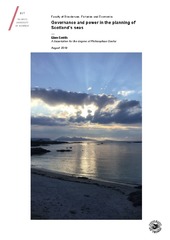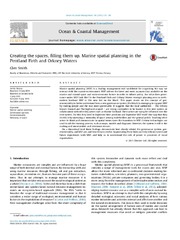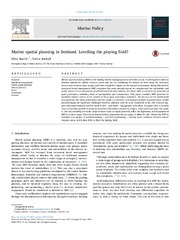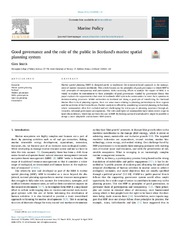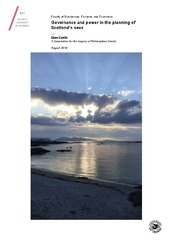| dc.contributor.advisor | Holm, Petter | |
| dc.contributor.author | Smith, Glen | |
| dc.date.accessioned | 2018-11-05T12:58:15Z | |
| dc.date.available | 2018-11-05T12:58:15Z | |
| dc.date.issued | 2018-11-21 | |
| dc.description.abstract | Marine spatial planning (MSP) is rapidly becoming the dominant approach to managing human interactions with marine environments. As this happens we are making more attempts to understand how it operates and how it might be improved. This study focuses on the governance of complex marine environments through MSP in Scotland. It focuses specifically on transparency and participation in MSP, and the role of stakeholders and the public. It seems that the system in Scotland has some room for improvement in terms of transparency and participation. Evidence from land use planning there shows that resistance to MSP might emerge if these improvements are made. One suggestion is made on how this could be avoided. | en_US |
| dc.description.doctoraltype | ph.d. | en_US |
| dc.description.popularabstract | Marine spatial planning (MSP) has its roots in town planning. It is fundamentally about organising our activities in the sea to minimise conflicts between these and also to minimise their impact on vulnerable ecosystems. However, the actions of a lot of people have to be organised for this to be achieved. This involves creating institutions and groups that will help to make MSP work. It seems that some groups are not entirely satisfied that marine planning is fair. In order for MSP to work it needs to be representative and produce outcomes that are widely desirable. | en_US |
| dc.description.sponsorship | The funding for this project was provided internally by UiT The Arctic University of Norway. Employee number 2338. | en_US |
| dc.identifier.isbn | 978-82-8266-160-7 | |
| dc.identifier.uri | https://hdl.handle.net/10037/14092 | |
| dc.language.iso | eng | en_US |
| dc.publisher | UiT The Arctic University of Norway | en_US |
| dc.publisher | UiT Norges arktiske universitet | en_US |
| dc.relation.haspart | <p>Paper I: Smith, G. (2015). Creating the spaces, filling them up. Marine spatial planning in the Pentland Firth and Orkney Waters. <i>Ocean & Coastal Management, 116</i>, 132-142. Also available at <a href=http://dx.doi.org/10.1016/j.ocecoaman.2015.07.003>http://dx.doi.org/10.1016/j.ocecoaman.2015.07.003. </a><p>
<p>Paper II: Smith, G. & Jentoft, S. (2017). Marine spatial planning in Scotland. Levelling the playing field? <i>Marine Policy, 84</i>, 33-41. Also available at <a href=http://dx.doi.org/10.1016/j.marpol.2017.06.024>http://dx.doi.org/10.1016/j.marpol.2017.06.024. </a> <p>
<p>Paper III: Smith, G. (2018). Good governance and the role of the public in Scotland’s marine spatial planning system. <i>Marine Policy, 94</i>, 1-9. Also available at <a href=https://doi.org/10.1016/j.marpol.2018.04.017>https://doi.org/10.1016/j.marpol.2018.04.017. </a><p> | en_US |
| dc.rights.accessRights | openAccess | en_US |
| dc.rights.holder | Copyright 2018 The Author(s) | |
| dc.rights.uri | https://creativecommons.org/licenses/by-nc-sa/3.0 | en_US |
| dc.rights | Attribution-NonCommercial-ShareAlike 3.0 Unported (CC BY-NC-SA 3.0) | en_US |
| dc.subject | VDP::Agriculture and fishery disciplines: 900::Fisheries science: 920 | en_US |
| dc.subject | VDP::Landbruks- og Fiskerifag: 900::Fiskerifag: 920 | en_US |
| dc.title | Governance and power in the planning of Scotland's seas | en_US |
| dc.type | Doctoral thesis | en_US |
| dc.type | Doktorgradsavhandling | en_US |


 English
English norsk
norsk